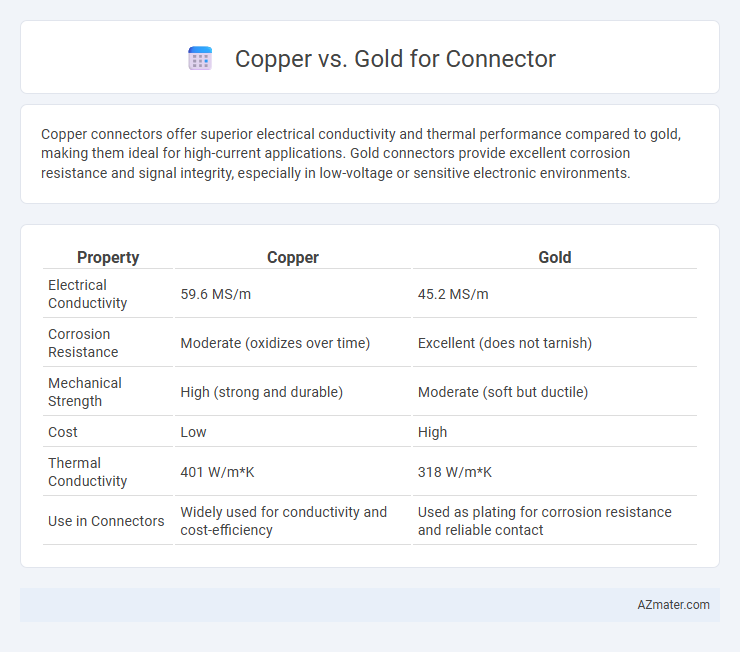Copper connectors offer superior electrical conductivity and thermal performance compared to gold, making them ideal for high-current applications. Gold connectors provide excellent corrosion resistance and signal integrity, especially in low-voltage or sensitive electronic environments.
Table of Comparison
| Property | Copper | Gold |
|---|---|---|
| Electrical Conductivity | 59.6 MS/m | 45.2 MS/m |
| Corrosion Resistance | Moderate (oxidizes over time) | Excellent (does not tarnish) |
| Mechanical Strength | High (strong and durable) | Moderate (soft but ductile) |
| Cost | Low | High |
| Thermal Conductivity | 401 W/m*K | 318 W/m*K |
| Use in Connectors | Widely used for conductivity and cost-efficiency | Used as plating for corrosion resistance and reliable contact |
Introduction to Copper and Gold in Connectors
Copper and gold are critical materials in connector manufacturing due to their excellent electrical conductivity and corrosion resistance. Copper offers superior conductivity and cost-effectiveness, making it ideal for bulk connector applications, while gold provides exceptional resistance to oxidation and reliable low contact resistance, essential for high-performance and signal integrity connectors. The choice between copper and gold hinges on balancing electrical performance, durability, and budget considerations in connector design.
Electrical Conductivity: Copper vs Gold
Copper offers superior electrical conductivity at approximately 5.96 x 10^7 S/m, making it an excellent choice for connectors requiring efficient current flow. Gold, while having lower conductivity at about 4.1 x 10^7 S/m, provides exceptional corrosion resistance and reliable performance in harsh environments. The trade-off between copper's higher conductivity and gold's durability often guides the selection based on application-specific electrical and environmental demands.
Corrosion Resistance and Durability
Gold connectors exhibit superior corrosion resistance compared to copper, making them ideal for environments prone to moisture and oxidation. Copper connectors, while more conductive and cost-effective, are susceptible to tarnishing and corrosion over time, which can degrade signal quality. Gold's inert properties ensure long-term durability and consistent performance, especially in critical electronic applications.
Cost Comparison: Budgeting for Connectors
Copper connectors generally offer a more cost-effective solution than gold connectors, with prices often averaging 50-70% lower per unit. While gold connectors provide superior corrosion resistance and conductivity, their higher material costs significantly impact budgeting, especially in large-scale projects. Choosing copper connectors can optimize upfront expenditures without compromising basic performance, making them ideal for budget-conscious applications.
Mechanical Strength and Reliability
Copper connectors exhibit superior mechanical strength due to their higher tensile strength and fatigue resistance, making them more durable under repeated stress and vibration. Gold connectors demonstrate exceptional reliability by providing excellent corrosion resistance and maintaining consistent electrical conductivity over time, even in harsh environments. Choosing copper ensures robust mechanical performance, while gold offers long-term reliability in maintaining stable, low-resistance connections.
Signal Integrity and Performance
Copper connectors provide superior signal integrity due to their excellent electrical conductivity and low resistance, which minimizes signal loss and attenuation in high-frequency applications. Gold connectors, while having slightly higher resistance, offer exceptional corrosion resistance and stable contact performance over time, ensuring consistent signal transmission in harsh environments. For optimal performance, copper connectors are preferred in high-speed data transfer scenarios, whereas gold-plated connectors excel in reliability and durability for long-term use.
Application Suitability: Where Each Excels
Copper connectors excel in applications requiring high electrical conductivity and cost-efficiency, making them ideal for power distribution and telecommunications. Gold connectors offer superior corrosion resistance and reliable low-contact resistance, making them perfect for precision electronics and high-frequency signal transmission. Copper suits heavy-duty, high-current environments, whereas gold is preferred in sensitive, low-voltage applications demanding long-term durability and signal integrity.
Environmental Impact and Sustainability
Copper connectors offer superior recyclability with a recycling rate exceeding 90%, significantly reducing environmental impact compared to gold, whose extraction is energy-intensive and associated with higher greenhouse gas emissions. Gold connectors, while highly resistant to corrosion and ensuring long-term performance, often involve environmentally damaging mining practices that contribute to habitat destruction and water pollution. Sustainable electronics design favors copper due to its abundance, lower extraction footprint, and efficient circular economy potential.
Industry Standards and Specifications
Copper connectors dominate industry standards due to superior electrical conductivity of 5.96 x 10^7 S/m, ensuring minimal signal loss and meeting stringent specifications such as UL 486A for safety and performance. Gold connectors, while exhibiting lower conductivity at 4.1 x 10^7 S/m, are highly valued for their exceptional corrosion resistance and reliable low-contact resistance, conforming to IPC-6012 standards for durability in harsh environments. Industry specifications favor copper for cost-effective high-performance applications, whereas gold plating is preferred in critical systems requiring long-term reliability and resistance to oxidation.
Choosing the Right Material for Your Connector
Copper connectors offer excellent electrical conductivity and cost-effectiveness, making them ideal for most standard applications requiring reliable signal transmission. Gold connectors, while significantly more expensive, provide superior corrosion resistance and ensure long-term durability in harsh or high-frequency environments. Selecting the right material depends on balancing budget constraints with performance needs, prioritizing copper for general use and gold for critical or precision connections.

Infographic: Copper vs Gold for Connector
 azmater.com
azmater.com